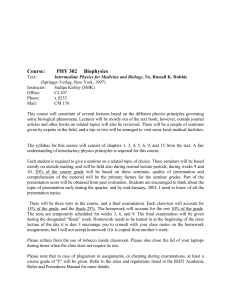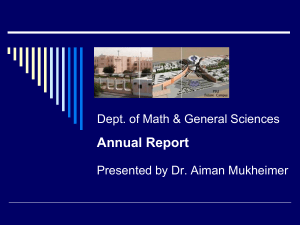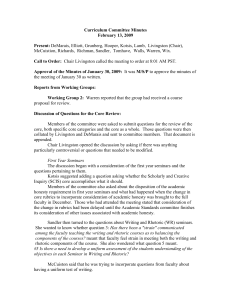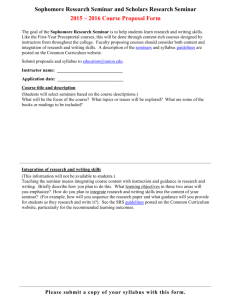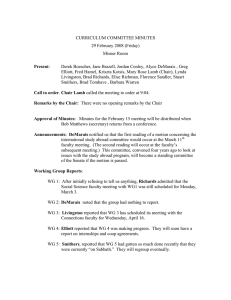Curriculum Committee Minutes March 6, 2009 Present:
advertisement
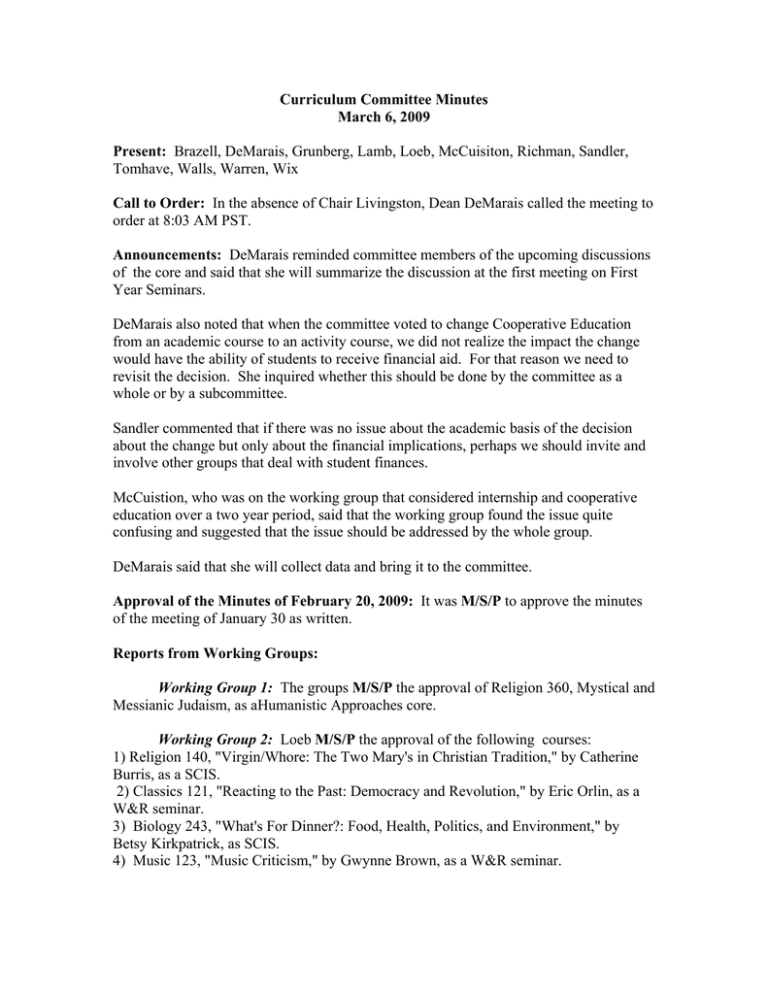
Curriculum Committee Minutes March 6, 2009 Present: Brazell, DeMarais, Grunberg, Lamb, Loeb, McCuisiton, Richman, Sandler, Tomhave, Walls, Warren, Wix Call to Order: In the absence of Chair Livingston, Dean DeMarais called the meeting to order at 8:03 AM PST. Announcements: DeMarais reminded committee members of the upcoming discussions of the core and said that she will summarize the discussion at the first meeting on First Year Seminars. DeMarais also noted that when the committee voted to change Cooperative Education from an academic course to an activity course, we did not realize the impact the change would have the ability of students to receive financial aid. For that reason we need to revisit the decision. She inquired whether this should be done by the committee as a whole or by a subcommittee. Sandler commented that if there was no issue about the academic basis of the decision about the change but only about the financial implications, perhaps we should invite and involve other groups that deal with student finances. McCuistion, who was on the working group that considered internship and cooperative education over a two year period, said that the working group found the issue quite confusing and suggested that the issue should be addressed by the whole group. DeMarais said that she will collect data and bring it to the committee. Approval of the Minutes of February 20, 2009: It was M/S/P to approve the minutes of the meeting of January 30 as written. Reports from Working Groups: Working Group 1: The groups M/S/P the approval of Religion 360, Mystical and Messianic Judaism, as aHumanistic Approaches core. Working Group 2: Loeb M/S/P the approval of the following courses: 1) Religion 140, "Virgin/Whore: The Two Mary's in Christian Tradition," by Catherine Burris, as a SCIS. 2) Classics 121, "Reacting to the Past: Democracy and Revolution," by Eric Orlin, as a W&R seminar. 3) Biology 243, "What's For Dinner?: Food, Health, Politics, and Environment," by Betsy Kirkpatrick, as SCIS. 4) Music 123, "Music Criticism," by Gwynne Brown, as a W&R seminar. Working Group 3: Walls moved acceptance of the School of Music Curriculum Review with reservations about any further expansion of course requirements for music majors. Loeb inquired about what “with reservations” meant. Walls responded that the requirements for the Bachelor of Music degree were increased by 0.75 units in this review and that they are warning the School to avoid any further addition to the major. Walls also noted that while some of the majors in the School of Music fit into our liberal arts ethos, the Bachelor of Music degree is really a music conservatory degree in a liberal arts setting and we have to come to terms with that. Sandler noted that the corollary of the conservatory nature of the BM is that they have a high number of courses and units in the major. In addition, they are strongly advised to take music courses to fulfill core requirements. For that reason, students are not able to explore other areas as we might like. After the discussion, the School of Music Review was accepted. For more information on the School of Music Review, see the appended memo from Working Group 3. Working Group 4 is continuing to work on the review of the upper division requirement. Working Group 5 is working on approval of a Special Interdisciplinary Major. Consideration of the Campus Discussion of First Year Seminars: Loeb asked what questions had been raised in the March 4th discussion of the first year seminars. Those members of the committee who had attended the meeting contributed the following: One area of discussion was the difference between the Writing and Rhetoric and Scholarly and Creative Inquiry seminars. These differences included consideration of what must be included in each type of seminar, what type of preparation faculty needed to teach the particular seminar, whether the Writing and Rhetoric seminars placed a burden on the English department faculty, how to handle the diversity of abilities of students in the first year seminars. There was also discussion of whether the two seminars should be sequenced. If the seminars were sequenced, Writing and Rhetoric would be placed first. The debate was then whether Scholarly and Creative Inquiry would be offered in the second semester of the first year or during the sophomore year. While some felt that having a core specifically for the sophomore year would be beneficial and would allow faculty to expect greater depth in writing and thinking, others noted that by the sophomore year students are beginning to focus on their major and would have less enthusiasm for “another hoop to jump through”. People also noted that requiring all students to take the Writing and Rhetoric seminar in the first semester would truly be a burden for the English Department. Members of the committee who had not attended the general discussion asked if there was an overwhelming desire for change. Those in attendance responded that while there wasn’t a revolution in the offing, people who taught in these core areas were noting difficulties that might be resolved Looking forward to the full faculty meeting of April 6, we asked what changes might be proposed for consideration by the faculty. It was suggested that the differences in the purpose and implementation of the two seminars be highlighted and reiterated, that both faculty and students should understand what they will be expected to achieve in each type of course. Designation of a “czar” for each of the seminars, someone who would be responsible for running workshops to develop faculty skills in teaching in the area as well as trying to see that courses did what was expected, was also suggested. And, although we had been told at the beginning that this would be a short meeting, it was 9:46 when Richman M/S/P for adjournment. Respectfully submitted, Mary Rose Lamb
